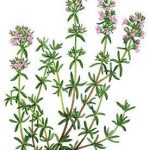 Tiny purple spears stood erect, their heads strained in one direction, as if intently listening. The Mother of Thyme had called a convocation. The sight reminded me of the Church, an assembly called into being on the cross and the primary place where we meet Christ. It is in the assembly that we know who Christ is.
Tiny purple spears stood erect, their heads strained in one direction, as if intently listening. The Mother of Thyme had called a convocation. The sight reminded me of the Church, an assembly called into being on the cross and the primary place where we meet Christ. It is in the assembly that we know who Christ is.
Where did you get your concept of God? Wasn’t it parents, teachers, friends, nature? And how do I reflect who God is? When I love others unconditionally, they have a better chance of knowing God’s unconditional life for them. When I sacrifice for a friend or relatives, that person understands a bit more of Christ’s sacrifice. When I share on a deep level, another sees more clearly how God in Christ is engaged with the world.
O God, as assembly, may we strain toward the completion of what we have been called to be: people upon whom the Spirit has been poured, people waiting for “the coming of that great and glorious day of the Lord.”
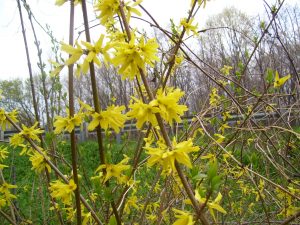 Having just finished flowering, the forsythia heard flattering remarks. A child said, “Mommy, look at the little yellow bells.” The botanist said, “This is a decorative genus of the olive family.” Passers-by remarked, “Look at the forsythia, a sure sign that spring is here!” But then the forsythia heard ominous words: “It’s time to prune.” In humility the forsythia bowed to the ordeal. Had the shrub refused, there would have not been flowers the following spring. Giving up its beauty, the forsythia preserved its future glory. Yielding to the pruning, the humble forsythia preserved its life.
Having just finished flowering, the forsythia heard flattering remarks. A child said, “Mommy, look at the little yellow bells.” The botanist said, “This is a decorative genus of the olive family.” Passers-by remarked, “Look at the forsythia, a sure sign that spring is here!” But then the forsythia heard ominous words: “It’s time to prune.” In humility the forsythia bowed to the ordeal. Had the shrub refused, there would have not been flowers the following spring. Giving up its beauty, the forsythia preserved its future glory. Yielding to the pruning, the humble forsythia preserved its life.
The paradox of losing life to save it is part of an incomprehensible divine logic. The seed breaks its cotyledons to sprout, fireweed flourishes after the land is burned, and clover is plowed under to enrich the soil. “Unless the grain of wheat falls to the earth and dies, it remains just a grain of wheat. But if it dies, it produces much fruit. The one who loves his life loses it, while the one who hates his life in this world preserves it to life eternal.”
Challenging God, prune me when you will.
 Overturning a rock reveals crawling grubs and squirming worms. Extremely important ecologically, these creatures enrich the soil and increase its porosity. They are part of a system in which sun, atmosphere, mineral fragments, chemical compounds, and living organisms interact. Unless we occasionally overturn a rock, we forget the life teeming below the surface.
Overturning a rock reveals crawling grubs and squirming worms. Extremely important ecologically, these creatures enrich the soil and increase its porosity. They are part of a system in which sun, atmosphere, mineral fragments, chemical compounds, and living organisms interact. Unless we occasionally overturn a rock, we forget the life teeming below the surface.
Overturning the “rocks” of our minds lets us see life. Removing the stones gives new perception to old ways of thinking, unchallenged views, unhealed memories, prejudice, or other mental blocks. Like the women going to the tomb, we need to ask, “Who will roll back the stone for us?”
Standing before the rolled back stone to the tomb, the women with spices were given access to something much greater than a sepulcher. The open entrance gave access to belief in resurrection: “He has been raised up; he is not here. See the place where they laid him.” The removed stone revealed life in its fullness-the resurrection life of the glorified Christ in which we now share.
God of Wonder, remove the stones that block life in us. And help us remove stones in others’ lives with our encouragement and support. With your divine life we can become our best selves—full of life.
Those who garden have a gift of accepting things as they are. They know certain plants cannot be planted beside others. They accept the need for acidic or alkaline soils. They know there’s “a time to plant, and a time to uproot the plant” (Eccles. 3:2).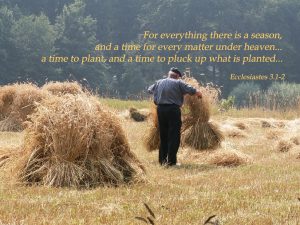
Accepting the ways of nature gives practice in accepting the ways of life. A parent ages, a spouse dies, a child is diagnosed with an incurable disease, violence comes to a quiet town. “This can’t be happening! Not to me, not to my family, not in my town!” we exclaim. When hardships occur, we can return to the garden, look around to all we have accepted as “the way things are” and ask the God of Creation for the grace of acceptance.
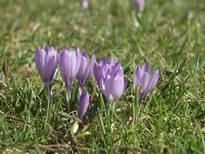 The green wheat fields give promise. Crocuses force their way through the topsoil. Tree buds approach the moment of explosion. Can you hear the groan of spring’s birthing?
The green wheat fields give promise. Crocuses force their way through the topsoil. Tree buds approach the moment of explosion. Can you hear the groan of spring’s birthing?
God has a plan: the mystery that began to be revealed in creation, reached its fullness in Christ, and strains toward eschatological fulfillment. The author of Colossians claims, “The mystery is Christ among you, your hope of glory” (Col. 1:27). Although the plan has been realized in Christ, it remains to be actualized in us. With creation we strain toward the glory, as we wait in hope.
Give a weed an inch, and it will take a “yard.” Consequently, weeding is vital, but not easy, for at times it’s difficult to distinguish between the desired plant and the weed. Pull both up, and the distinction, however, becomes obvious in their 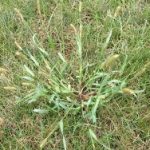 roots. (To paraphrase Scripture, by their roots you shall know them.) Weeds have only a main taproot, which lets them grow quickly. Flowers, trees, and vegetables, on the other hand, have a more complicated root system, that slows the growth, permitting more time for the plants to develop durability and beauty.
roots. (To paraphrase Scripture, by their roots you shall know them.) Weeds have only a main taproot, which lets them grow quickly. Flowers, trees, and vegetables, on the other hand, have a more complicated root system, that slows the growth, permitting more time for the plants to develop durability and beauty.
When we look back over the years, it may seem that our spiritual life grows slowly. Perhaps the slow growth may be God’s way of giving us sturdy rootedness in the divine.
Ver sacrum—“holy spring”!
Come, O south wind,
Blow upon my garden.
Now the acceptable time!
Crocuses slither out of winter’s belly
Like Jonah sputtering relief.
And jonquils and daffodils yawn.
Christ, our Awakener, bid us rise
And live your life.
Wake up! Rise up!
The forty days and nights of snow are gone.
Run from the well
Your neighbors to tell
Of One who knows all.
Rise from tomb
Unbind and go free!
Blind beggars see light
In later shadows of night.
Come, blessed of my Father,
Inherit the season prepared for you!
Let no flower of spring pass us by.
Let life resound!
But hold back your “Alleluia” until
You are made worthy to see the
Firstfruits of the Lord’s Passion
And the Holy Pascha in spiritual joy.
Parce, Domine!
Leave a gracious blessing, Creator God,
Leave an aching longing for Pleroma
When all creation sings perpetually
Surrexit Christus, alleluia!
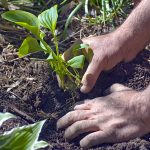 People who love to dig in the soil feel an urge around February to get into their gardens. Their hands need to be in the earth. However, until winter turns to spring, they must content themselves with repotting house plants.
People who love to dig in the soil feel an urge around February to get into their gardens. Their hands need to be in the earth. However, until winter turns to spring, they must content themselves with repotting house plants.
In the spiritual realm we sometimes feel a similar urge to get digging, to get growing. “The love of Christ impels us,” we read in Scripture and feel this urge in our hearts as our spiritual winter thaws. May such moments urge us to wonder, “What more do you want of me, Lord?”
 A mystic of the fourteenth century, Meister Eckhart wrote, “Whatever God does, the first outburst is always compassion.” Sometimes we don’t know how to help people. They lose a job, experience violence or disaster, cope with failure or loss; and we don’t know how to respond. Like God, our first response can be compassion.
A mystic of the fourteenth century, Meister Eckhart wrote, “Whatever God does, the first outburst is always compassion.” Sometimes we don’t know how to help people. They lose a job, experience violence or disaster, cope with failure or loss; and we don’t know how to respond. Like God, our first response can be compassion.
“ Whoever would save his life will lose it, but whoever loses his life for my sake will find it.” The doctrine of the cross is a bittersweet legacy of Christ to his followers—bitter in the loss, sweet in the finding. It is the paradox of death being life, crucifixion being salvation. When we descend to the bottom of our brokenness, our helplessness, then we can rise to new wholeness.
Whoever would save his life will lose it, but whoever loses his life for my sake will find it.” The doctrine of the cross is a bittersweet legacy of Christ to his followers—bitter in the loss, sweet in the finding. It is the paradox of death being life, crucifixion being salvation. When we descend to the bottom of our brokenness, our helplessness, then we can rise to new wholeness.
To start life anew we must sometimes break with our past. Perhaps we need to give up old illusions or old habits. Letting go and surrendering is so foreign that we can easily grab back those things of which we’ve let go. They must be thrown away again and again. But in the discarding we have possibility for new insights, new realities. Miracles happen, life is restored, God’s love is released. We have risen. It is true!
O God, Divine Gardener, help me weed out my root problems. Through my bitter dying to self I offer myself to You as a sweet fragrance.

